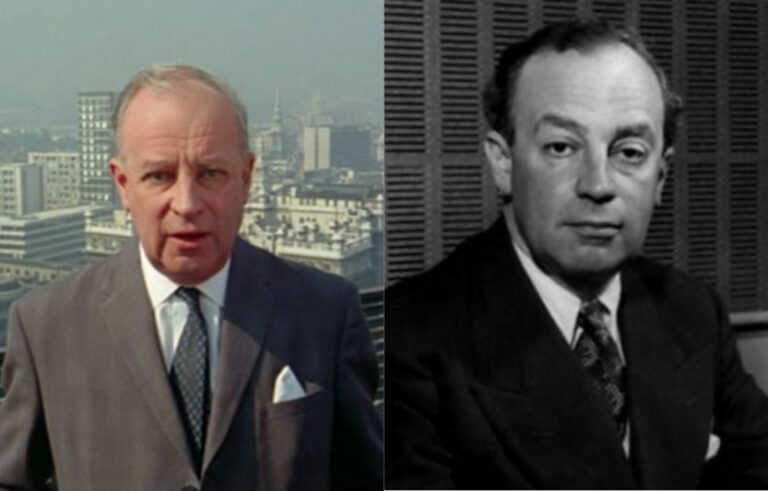Edgar Lustgarten was one of Britain’s most influential voices in crime literature and broadcasting. His work bridged the gap between law and storytelling, captivating audiences through books, radio, and television.
Quick Bio
| Attribute | Details |
|---|---|
| Full Name | Edgar Marcus Lustgarten |
| Birth Date | May 3, 1907 |
| Place of Birth | Broughton Park, Salford, Lancashire, UK |
| Nationality | British |
| Education | Manchester Grammar School, St John’s College, Oxford |
| Occupation | Barrister, Author, Broadcaster |
| Known For | True crime writing and legal broadcasting |
| Spouse | Joyce Goldstone (married 1932 – died 1972) |
| Children | None |
| Date of Death | December 15, 1978 |
| Age at Death | 71 Years |
Early Life and Background
Born into a family with strong legal roots, Edgar Lustgarten was the son of Joseph Lustgarten, a Romanian-Jewish barrister, and Sara Finklestein. His upbringing in Salford, Lancashire laid the groundwork for his affinity for justice and storytelling. With his father’s courtroom presence shaping his worldview, Edgar was exposed early to the mechanics of British law and its moral complexities.
Education and Academic Achievements
Edgar’s scholastic journey began at Manchester Grammar School, one of the most reputable schools in England. He later attended St John’s College, Oxford, earning not only academic accolades but also the distinguished role of President of the Oxford Union in 1930. This role polished his eloquence and public speaking, two talents that later defined his broadcasting persona.
Legal Career and Transition to Writing
After graduating, Edgar Lustgarten became a barrister, practicing from 1930 to 1940. His firsthand experience in the legal system gave his future writing profound authenticity. Rather than writing fiction based on fantasy, Edgar chronicled the complexity of real criminal cases—often drawing from actual court proceedings. This unique blend of law and literature formed the foundation for his acclaimed works like A Case to Answer and Verdict in Dispute.

World War II and Broadcasting Career
Unable to serve on the frontlines due to health issues, Lustgarten turned his attention to wartime broadcasting. Under the pseudonym Brent Wood, he contributed to Radio Counter-Propaganda, crafting psychological narratives aimed at countering Axis powers. After the war, he joined the BBC as a staff producer, solidifying his role as a prominent voice in British media.

Rise as a Crime Writer
Edgar Lustgarten’s writing emerged from a deep well of courtroom drama and justice. He mastered both crime fiction and non-fiction, often examining the human psyche behind criminal acts. Books like The Business of Murder and Crimes to Remember became staples in true crime libraries, celebrated for their accuracy, psychological depth, and legal insight.
Television and Radio Fame
Edgar soon translated his gripping narratives to radio and TV. He hosted Scotland Yard (1953–1961), a dramatized series of solved crimes, followed by The Scales of Justice (1962–1967). His radio shows Advocate Extraordinary and Prisoner at the Bar dissected real trials with engaging commentary. His authoritative, reassuring voice and articulate delivery earned him national recognition.
Age and Physical Appearance
Though not often detailed in records, Edgar Lustgarten was portrayed as having a commanding and dignified presence. On screen, he projected the image of a wise barrister—tall, well-dressed, and deliberate in speech. He passed away at the age of 71, maintaining his composure and elegance until his final moments.
Personal Life and Relationships
Lustgarten married Joyce Goldstone in 1932, and they remained together until her death in 1972. The couple had no children, and Edgar remained somewhat private about his romantic life. Interestingly, he once courted actress Miriam Karlin during the 1950s, though she declined his proposal. His emotional depth remained evident in his storytelling, even if his own relationships stayed guarded.

Later Years and Controversies
Despite his refined public image, Edgar Lustgarten’s later years weren’t free from controversy. He was a vocal supporter of corporal punishment, which many viewed as regressive in a changing justice system. More shockingly, he was associated with the mysterious death of a young woman found in his bath—a case that remains ambiguous to this day.
Death and Legacy
On December 15, 1978, Lustgarten died peacefully while reading The Spectator at the Marylebone Library. In homage to his contributions, the library named its true crime section in his honor. Today, he is remembered not just for his legal acumen, but for giving criminal justice a voice that resonated with the public.
Cultural Impact
His influence bled into pop culture long after his death. In 1984, Australian group Severed Heads used his voice in the track Dead Eyes Opened. His signature delivery style was even mimicked in cult classics like The Rocky Horror Picture Show. Such tributes reflect his lasting impact in crime storytelling and media history.

Conclusion
Edgar Lustgarten carved a unique niche where law, literature, and media intersected. His works remain essential for anyone exploring the evolution of crime journalism or legal broadcasting. With every case he told, he didn’t just narrate crime—he dissected the very idea of justice.
Frequently Asked Questions
1. Who was Edgar Lustgarten? He was a British barrister, author, and broadcaster known for true crime storytelling.
2. What are Lustgarten’s most famous works? Some key titles include A Case to Answer, Verdict in Dispute, and The Business of Murder.
3. Was Edgar Lustgarten involved in any controversies? Yes, including his support of corporal punishment and a mysterious death incident.
4. Did Edgar Lustgarten have children? No, he and his wife Joyce Goldstone did not have children.
5. How did Lustgarten die? He passed away peacefully while reading at Marylebone Library in 1978.
